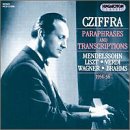| All Artists: Franz Liszt, Gyorgy Cziffra, György Cziffra Title: Piano Paraphrases & Transcriptions Members Wishing: 1 Total Copies: 0 Label: Hungaroton Release Date: 9/19/1995 Album Type: Import Genres: Special Interest, Classical Styles: Marches, Historical Periods, Modern, 20th, & 21st Century Number of Discs: 1 SwapaCD Credits: 1 UPC: 789368242825 |
Search - Franz Liszt, Gyorgy Cziffra, György Cziffra :: Piano Paraphrases & Transcriptions
 | Franz Liszt, Gyorgy Cziffra, György Cziffra Piano Paraphrases & Transcriptions Genres: Special Interest, Classical
|
Larger Image |
CD Details |
CD ReviewsThe best lisz interpret marcel mombeek | belgium | 01/19/2000 (5 out of 5 stars) "who else but Cziffra could play these transcriptions? When you hear him play for example the Rigoletto paraphrase, it seems he had wrote it himself. Cziffra s technique permitted him to play everything like he wanted to play it, he had no difficulties, and, his interpretation was always interesting. He was a real musician, when he played ten times a piece on concert, it was ten times different, you had the impression to hear it for the first time. visit the cziffra site." No holds barred Michael Whincop | GRIFFITH UNIVERSITY, QLD AUSTRALIA | 10/14/2000 (4 out of 5 stars) "Cziffra's Liszt is miraculous. Despite his phenomenal virtuosity, you never see Liszt in Cziffra's hands as empty, calculating or artificial -- it breathes, it contemplates, it angers, it weeps. This disk, however, is not quite the ideal first disk for sampling Cziffra's Liszt. The Tannhäuser, though, is truly superb. It must be the best recording of the work ever, as he brings real breadth to the Pilgrim's Chorus at the beginning and the end, but elsewhere the music has tremendous fire and energy. The Rigoletto paraphrase is also very fine, having an improvisatory quality that flanks its tendency to sound a bit overelaborated. Some of the other items, though, are a bit too much of a good thing. You wish Cziffra could relax a little, turn the heat down a bit in parts of the Auber and his own inimitable transcriptions. Thus, this is quite an exhausting disk, superb for dipping into, but a bit much for day to day listening. The sound is in parts on the rough side." The eternal bewitchment ! Hiram Gomez Pardo | Valencia, Venezuela | 02/13/2007 (5 out of 5 stars) "
Mephisto's figure always exerted on Liszt a fascinating and visible attraction. Not only it was inspiration's source around his well known Symphonic poem, but several compositions for piano. It was like a far echo who claimed by express itself, that somehow became an organic necessity to explore those underworld landscapes in the great literary tradition that included Goethe among other remarkable philosophers, minor writers, essayists and all sort of artists. Nobody like him (with perhaps the only exception of Charles Valentin alkan occupied such rank in his enormous body of compositions. On the other hand being Liszt a son of his time, he was very aware he represented the last generations of a dying romanticism and so he was conscious he had to keep ignited that torch, before the last suspire. Of course, the obsessive treatment of the Dies Irae is still present in composers to come, like Rachmaninoff but approached from a different perspective. So, in case you are a hard fan of this composer, it would be unfinished a collection of the most representative craft of this legendary Hungarian master, not to include these transcriptions, without missing the Mephisto Waltz, Totentanz, and the Faust Symphony in order to acquire a major knowledge about the extent and significance of the last romantic musical ambassador the world had in the last stages of the XIX Century. These transcriptions, on the other hand, carve in relief the majuscule craft of this notable musician. " |

 Track Listings (7) - Disc #1
Track Listings (7) - Disc #1